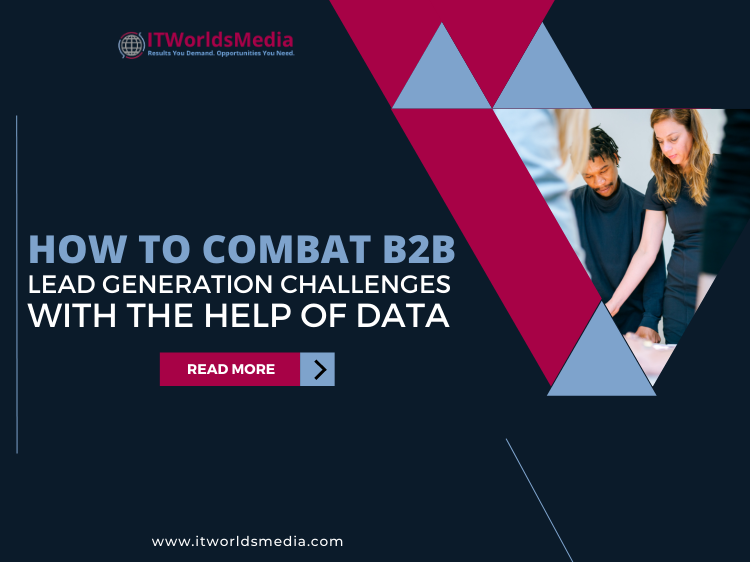 2022-03-31
2022-03-31
How to Combat B2B Lead Generation Challenges With the Help of Data
Lead generation is one of the most challenging aspects of B2B sales and marketing. Hence, reducing lead gen challenges has become the top most priority of marketers as it directly affects the sales and revenue of any b2b business. It takes a lot of expertise and experience to target the right audience, use and optimize various lead gen techniques so that one can get the best MQLs and SQLs. Identifying these challenges is the first step towards creating effective lead gen strategies and results, However the key element in successful lead gen is data and marketers need to optimize it for best results.
This blog talks about the various lead generation challenges in B2B and tips and tricks to combat those challenges with the help of data.
What are some of the significant lead generation challenges in today’s market?
Generating quality leads is the prime objective of B2B marketing professional and considering the complex nature of B2B it has become the prime challenge of marketers too.
- Difficulty in maintaining quality of content: Engaging content is what makes the viewer interested to learn more about the B2B services. However, it is difficult to maintain the content standards with time. Consistency, insights and innovation is the key here.
- Research becomes time-consuming: B2B marketers need to do a lot of research for understanding buyer personas, getting to know the needs of the customers etc. Without competent resources, this becomes a time-consuming process.
- Collecting useful data: With enormous amounts of data available today, the real challenge in not in acquiring data, it is in acquiring the right and relevant data. Without the right data, it’s difficult to analyze and find organic leads.
- Managing & tracking leads: It's difficult to coordinate with the sales and marketing team to handle the generated leads, to monitor and keep a track of those leads. Lack of alignment of sales and marketing is also a big challenge for lead gen.
Besides the above challenges, B2B lead generation depends on allocating budget and resources. Without consistent research & planning, it’s difficult to maintain quality leads for B2B. The most effective way to eliminate all the challenges is to use data correctly.
Why is data the backbone of B2B sales?
B2B data is essential to give the sales team a bird’s eye view of the various business prospects. B2B data is primarily used to fuel B2B marketing activities with effective strategies. Here are some advantages that b2b marketers can enjoy, if they have access to the right data-
- Generate more business opportunities
- Identify and segregate potential leads
- Enhance marketing research tactics
- Improve industry knowledge
- Understand current market demands
- Generate more demand
Quality data allows marketers to tackle and combat challenges involved in lead generation. Data analysis provides accurate marketing insights to improve B2B operations and align sales and marketing teams around consistent goals.
How can data help reduce lead generation challenges?
Data-driven B2B firms can make incredible achievements through lead generation. A lack of data leads to different barriers to lead generation. So how do we combat these barriers?
Use customer-focused data for lead scoring: Don't get caught up only to increase the number of leads. The relevance of the generated leads is very important. Customer-focused data is the key to moving the leads to the next stages of the B2B sales funnel. It is useful to understand customer inclinations and buying motives so that one can generate demand and create customized solutions to convert the prospects into paying customers.
Enhance chances of conversions: Data quality is important to ensure that all marketing and lead generation strategies are accurate and effective. So B2B firms should update their databases frequently and categorize their data to make it more workable. This hard-work can increase the effectiveness of data, optimize data and thus enhance the chances of lead conversions.
Customize the lead nurturing process: Personalization of the data-driven lead nurturing process is an empathy-based approach for generating leads or communicating with leads. It aligns the sales teams with new leads and their purchase habits. The salesperson can use the data for lead nurturing, by mapping the digital footprints of the buyer and of getting insights about their purchase history.
More proficient data means more useful leads. Successful lead generation is possible if businesses can overcome the challenges by prioritizing data.
Conclusion
Gather, analyze, and nurture B2B leads based on accurate and updated data collected from various sources. It will help you understand your audience's requirements and constantly experiment with new tools and technologies. Personalize your leads generation strategies to combat its challenges effectively.
